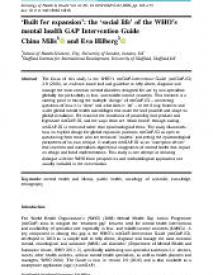‘Built for expansion’ : the‘social life’of the WHO’smental health GAP Intervention Guide
The focus of this study is the WHO’s mhGAP-Intervention Guide (mhGAP-IG) 2.0 (2016), an evidence-based tool and guideline to help detect, diagnose and manage the most common mental disorders, designed for use by non-specialists globally but particularly in low- and middle-income countries. This research is a starting point in tracing the multiple ‘doings’ of mhGAP-IG – connecting questions of how it is ‘done’ and what does it ‘do’ – to the living histories and wider global mental health assemblages that make the tool possible and shape its global circulation. We examine the conditions of possibility that produce and legitimate mhGAP-IG, and the ways these are ‘black boxed’ through casting mhGAP-IG in technical rather than epistemological terms. The study illuminates how its explicit design for global expansion positions mhGAP-IG as open to questioning from those who are technical ‘insiders’ and setting the epistemological parameters of its own critique. It analyses mhGAP-IG as an ‘inscription device’ that inscribes and materialises algorithmic imaginaries of mental health that impact on design and local implementation. This study is one attempt at initiating dialogue with the WHO from perspectives and methodological approaches not usually included in the conversation.
Geachte bezoeker,
De informatie die u nu opvraagt, kan door psychotraumanet niet aan u worden getoond. Dit kan verschillende redenen hebben,
waarvan (bescherming van het) auteursrecht de meeste voorkomende is. Wanneer het mogelijk is om u door te verwijzen naar de bron
van deze informatie, dan ziet u hier onder een link naar die plek.
Als er geen link staat, kunt u contact opnemen met de bibliotheek,
die u verder op weg kan helpen.
Met vriendelijke groet,
Het psychotraumanet-team.
In: Sociology of Health & Illness ISSN: 0141-9889 | 41 | S1 | 162-175
https://onlinelibrary.wiley.com/doi/epdf/10.1111/1467-9566.12870


